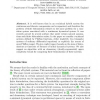Free Online Productivity Tools
i2Speak
i2Symbol
i2OCR
iTex2Img
iWeb2Print
iWeb2Shot
i2Type
iPdf2Split
iPdf2Merge
i2Bopomofo
i2Arabic
i2Style
i2Image
i2PDF
iLatex2Rtf
Sci2ools
107
click to vote
CSL
2004
Springer
2004
Springer
Pfaffian Hybrid Systems
It is well known that in an o-minimal hybrid system the continuous and discrete components can be separated, and therefore the problem of finite bisimulation reduces to the same problem for a transition system associated with a continuous dynamical system. It was recently proved by several authors that under certain natural assumptions such finite bisimulation exists. In the paper we consider o-minimal systems defined by Pfaffian functions, either implicitly (via triangular systems of ordinary differential equations) or explicitly (by means of semi-Pfaffian maps). We give explicit upper bounds on the sizes of bisimulations as functions of formats of initial dynamical systems. We also suggest an algorithm with an elementary (doubly-exponential) upper complexity bound for computing finite bisimulations of these systems.
Automated Reasoning | Continuous Dynamical System | CSL 2004 | Dynamical Systems | Finite Bisimulations |
Related Content
| Added | 20 Aug 2010 |
| Updated | 20 Aug 2010 |
| Type | Conference |
| Year | 2004 |
| Where | CSL |
| Authors | Margarita V. Korovina, Nicolai Vorobjov |
Comments (0)

